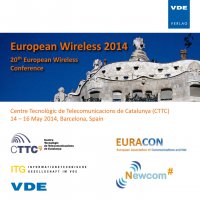Cell Spectral Efficiency Analysis of Relay Enhanced and Picocell Enhanced LTE Systems
Konferenz: European Wireless 2014 - 20th European Wireless Conference
14.05.2014 - 16.05.2014 in Barcelona, Spain
Tagungsband: European Wireless 2014
Seiten: 8Sprache: EnglischTyp: PDF
Persönliche VDE-Mitglieder erhalten auf diesen Artikel 10% Rabatt
Autoren:
Chen, Yuan; Walke, Bernhard (Communication Networks (ComNets) Research Group, Faculty of Electrical Engineering and Information Technology, RWTH Aachen University, Germany)
Inhalt:
A novel analytical framework is presented to evaluate resource consumption, error ratio, and spectral efficiency on PHY, MAC and RLC layer in relay enhanced 3GPP LTE systems. Thereby, various aspects of the various LTE protocol layers are modeled: On PHY layer, association of user terminal to a radio access point, probabilistic radio channel states, adaptive modulation and coding, overhead in LTE radio frame, turbo coded M-QAM block error rate, and Chase combining are taken into account. On MAC layer, hybrid-ARQ protocol, resource assignment failure, and feedback misdetection are accounted for. On RLC layer, segmentation of a RLC SDU into several RLC PDUs, selective repeat - ARQ protocol, feedback loss, and timer for upcoming feedback to be waited for are considered. Aspect of two hop transmission is modeled and analyzed for decode and forward relaying. The framework is useful to evaluate various performance parameters for relay enhanced cells and for picocell enhanced donor cells as well: Resource consumption, error ratio and spectral efficiency are calculated as CDFs for any location in a multi-cell scenario, as location specific expected values, as CDFs for a cell, and as related expected values and percentiles.


